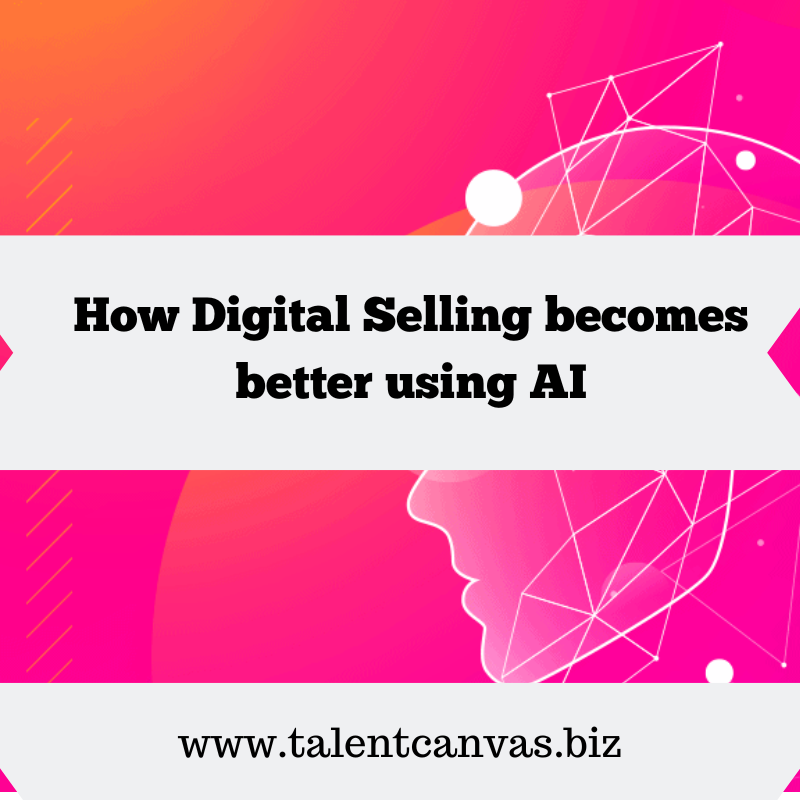The internet era has completely changed the way companies market their goods and services, with digital selling now being a crucial component of contemporary trade. With tools and insights that improve every step of the sales process, artificial intelligence (AI) is further transforming this industry. AI is transforming digital selling into a more successful, individualized, and efficient process from lead generation to client engagement. This is how AI is making digital selling better.
1. Enhanced Lead Generation and Scoring
AI-Driven Lead Generation: Through data analysis from a variety of sources, including social media, web searches, and online behavior, AI is able to discover possible clients. Sales teams may find excellent leads with a higher conversion rate with the aid of this skill.
Example: Machine learning is used by AI solutions such as LinkedIn Sales Navigator to identify and recommend leads based on user profiles and interactions.
Lead Scoring: AI systems are capable of assigning a score to leads based on a variety of criteria, including interaction patterns, demographic data, and past involvement. This boosts productivity and conversion rates by enabling sales teams to give priority to high-potential leads.
Example: Sales teams may target the most promising leads with the use of AI-powered predictive lead scoring tools like Salesforce Einstein and HubSpot.
2. Personalization at Scale
Customized Customer Interactions: AI can create highly personalized experiences by analyzing customer data. It customizes sales pitches, product recommendations, and marketing messages for each customer by understanding their unique preferences and behaviors.
Example: Amazon’s AI recommendation engine suggests products based on previous purchases and browsing history, significantly increasing opportunities for upsells and cross-sells.
Dynamic Content Creation: AI can produce individualized content for websites, social media, and emails, making sure that every consumer sees content that is interesting and relevant to them. Stronger client relationships are fostered and engagement is increased by this degree of customisation.
Example: Artificial intelligence (AI) is used by programs like Persado to generate tailored marketing messages that connect with specific consumers and increase response rates and conversions.
3. Improved Customer Engagement
AI Chatbots: AI-driven chatbots respond to consumer questions instantly and offer round-the-clock assistance. These chatbots can perform a wide range of functions, enhancing the general customer experience by helping clients with routine inquiries and assisting them with the purchasing process.
Example: AI chatbots are used by platforms such as Drift and Intercom to interact with website visitors, qualify leads, and even close sales.
Predictive Customer Insights: Sales teams may proactively address customer complaints and offer customized solutions by using AI to evaluate client data and forecast future behaviors and demands.
Example: Insights into consumer demands are provided by tools like Zendesk’s AI-driven customer care solutions, which allow for more proactive and individualized help.
4. Sales Process Automation
Task Automation: AI can automate time-consuming, repetitive processes like scheduling meetings, entering data, and sending follow-up emails. Salespeople may now concentrate on higher-value tasks like developing connections and completing deals thanks to this automation.
Example: AI is used by programs like Pipedrive and Zoho CRM to automate repetitive operations, increasing efficiency and productivity.
Sales Forecasting: AI is able to produce precise sales projections by analyzing previous sales data and market trends. These insights support companies in making defensible choices regarding budget allocation, marketing tactics, and inventory.
Example: Artificial intelligence (AI) is used by programs like InsideSales.com and Clari to forecast sales results, improving strategy and planning.
5. Enhanced Analytics and Insights
Deep Data Analysis: Large amounts of data can be processed and analyzed by AI significantly more rapidly and correctly than by humans. Businesses can learn more about consumer behavior, industry trends, and campaign effectiveness thanks to this capabilities.
Example: AI-driven analytics are available on platforms like IBM Watson and Google Analytics, which assist companies in understanding and optimizing their marketing and sales initiatives.
Real-Time Insights: AI can provide real-time data and insights, allowing sales teams to quickly adapt their plans and react to changes in the market.
Example: Real-time dashboards and reports are provided by AI technologies that are coupled with CRM systems, assisting sales teams in being informed and flexible.
Conclusion
Through better lead generation, personalized customer interactions, increased engagement, process automation, and deep analytics, artificial intelligence is revolutionizing digital selling. These developments help companies run more smoothly, establish stronger connections with clients, and eventually increase revenue. AI technology’s influence on digital selling will only increase as it develops, providing companies with more chances to thrive in the cutthroat online market.
Using AI into digital selling is not merely a technical advancement; for businesses hoping to stay competitive and prosper in the current business climate, it is a strategic requirement. Businesses can achieve sustainable development, improve client experiences, and streamline sales processes by utilizing artificial intelligence.
For more insights on AI’s impact on marketing, check out AI in Entrepreneurship: A Game-Changer for Small Business Owners.
Interested to learn Digital Marketing using AI or get your LinkedIn profile and CV revamped? WhatsApp your details to +917358778295 and we’ll get back to you asap.


